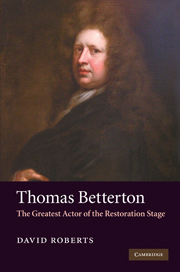Book contents
- Frontmatter
- Dedication
- Contents
- List of illustrations
- Acknowledgements
- Note on dates and texts
- Chapter 1 Introduction
- Chapter 2 Look, my lord, it comes
- Chapter 3 An obstinately shadowy Titan
- Chapter 4 An actor of London: early years, 1635–1659
- Chapter 5 A walk in the park
- Chapter 6 In the Duke’s Company, 1660–1663
- Chapter 7 Equal with the highest
- Chapter 8 Actor management
- Chapter 9 In the Company of the Duke
- Chapter 10 Union
- Chapter 11 Back to the future
- Chapter 12 Books and pictures
- Notes
- Bibliography
- Index
Chapter 11 - Back to the future
breakaway to semi-retirement
Published online by Cambridge University Press: 05 July 2014
- Frontmatter
- Dedication
- Contents
- List of illustrations
- Acknowledgements
- Note on dates and texts
- Chapter 1 Introduction
- Chapter 2 Look, my lord, it comes
- Chapter 3 An obstinately shadowy Titan
- Chapter 4 An actor of London: early years, 1635–1659
- Chapter 5 A walk in the park
- Chapter 6 In the Duke’s Company, 1660–1663
- Chapter 7 Equal with the highest
- Chapter 8 Actor management
- Chapter 9 In the Company of the Duke
- Chapter 10 Union
- Chapter 11 Back to the future
- Chapter 12 Books and pictures
- Notes
- Bibliography
- Index
Summary
To the stubbornness of his North Somerset community, with its history of defying both royal and parliamentary tax collectors, Christopher Rich added the brains and money required for a legal career. In his late twenties he was at Gray’s Inn, clerk to Sir Thomas Skipwith, Sergeant-at-Law, and falling in with Skipwith’s son, also Thomas. Joint business interests developed. Skipwith Junior bought a share of the Duke’s Company on 31 March 1682, after the secret discussions about the United Company but six weeks before the formal agreement. There was every reason for someone with inside knowledge to believe that the new monopoly would make money, even if shares were costly. But it was not quite the success Skipwith hoped for, however well the actors did from it. He and Rich looked on and wondered how long they could put up with that acquisitive yet profligate bastion of the establishment, Thomas Betterton.
Their chance came with Charles Davenant’s transfer of shares to his brother Alexander in 1687. Alexander could not afford them any more than he could afford to pay Skipwith back for his help in buying them. All he could do was sign over to him the dividends and, at the end of the road, the shares themselves. Betterton acted on oblivious as, on 22 March 1688, Christopher Rich acquired his first slice of the company. Alexander remained a useful front. On 18 March 1690 he became manager of Rich’s interest, which now extended to one-sixth of the stock.
On the surface this was a quiet month for Betterton, a fact which might not have passed Rich by. There were two premieres - John Crowne’s The English Friar and Thomas Shadwell’s The Amorous Bigot but Thomas and Mary Betterton featured in neither. He was busy all right, but with another spectacular. In June 1690 appeared an adaptation attributed to Betterton of Massinger and Fletcher’s The Prophetess, ‘being set out with Costly Scenes, Machines and Cloaths: The Vocal and Instrumental Musick, done by Mr Purcel; and Dances by Mr Priest; it gratify’d the Expectation of Court and City; and got the Author great Reputation.’
- Type
- Chapter
- Information
- Thomas BettertonThe Greatest Actor of the Restoration Stage, pp. 154 - 172Publisher: Cambridge University PressPrint publication year: 2010



